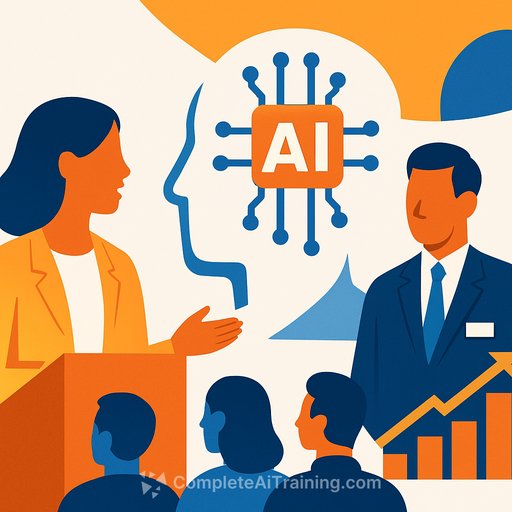Day One at the Gartner CFO & Finance Executive Conference in London put artificial intelligence, identity, and transformation at the heart of the CFO agenda. Conversations with leaders from FloQast, BlackLine, Soldo, and others highlighted a clear shift: finance is moving from a role focused on control to one that acts as a catalyst for growth.
Finance Needs a New Identity
Gartner analysts Mallory Bulman and Clement Christensen kicked off the event by challenging finance leaders to rethink their approach. Instead of viewing digital projects as isolated fixes, they urged a redefinition of finance’s core identity. They outlined eight forces shaping finance through 2030, including the rise of AI-driven decision-making, talent shortages, and regulatory changes. The key takeaway was the emergence of the “catalyst CFO,” who:
- Reframes how finance talks about itself
- Embraces complexity
- Uses business tools over adding headcount
- Focuses on products instead of just processes
This mindset affects how finance teams are perceived—either as cost centers or strategic drivers.
Leadership and AI Under the Microscope
Dennis Gannon, Gartner VP Analyst, shared concerning data: less than half of finance employees are satisfied with their management, and 25% plan to leave. He warned that promoting technical experts without leadership skills leads to disengagement. His solution is “connector managers” who combine empathy and adaptability with business know-how.
Marco Steecker, Senior Director of Research at Gartner, urged CFOs to actively shape AI adoption. Finance leaders must align AI initiatives with business goals, yet fewer than 40% are consulted on AI projects. This gap risks sidelining finance in key decisions.
Gartner’s Clement Christensen emphasized the power of storytelling in finance. Numbers alone rarely persuade; wrapping data in clear narratives and visuals is essential. Poor communication can cost companies up to 8% of EBITDA.
Insights from Industry Leaders
FloQast: AI, Change Management, and the Close
Hugh O’Neill from FloQast highlighted two dominant themes: AI and managing change. Technology frees finance teams from repetitive tasks, enabling focus on strategic decisions. He stressed the pressure to shorten the close cycle, envisioning a future where AI handles transactional work and humans tackle higher-level issues.
O’Neill predicts a skill shift in finance teams—from 80% traditional finance roles to a balanced 50/50 split with systems-focused roles. Leaders must guide this transition and celebrate progress along the way.
BlackLine: Building Trust in AI
BlackLine’s session was packed, reflecting CFOs’ focus on trust in AI. Executives Philippe Omer-Decugis and Josh May noted that 95% of AI projects fail to deliver ROI due to immature change management or unclear use cases. CFOs want clear, proven applications that deliver value.
BlackLine’s Verity platform uses ERP data to validate journal entries at their source, improving reconciliation and financial accuracy. This approach reduces errors and limits the need to increase headcount. The company also stressed the importance of CFO-CIO partnerships during ERP migrations, especially to SAP S/4HANA.
Soldo: From Guardian to Catalyst
Brandon Till of Soldo described their platform as a way to manage decentralized spending without creating bottlenecks. He urged CFOs to move away from a “guardian mindset” that restricts access and slows teams down. Instead, finance should enable employees to act quickly and confidently.
Till also warned of an impending retirement wave in accounting and emphasized the need to attract young talent with modern tools and a strategic role for finance teams. Internally, Soldo leverages AI across multiple functions to streamline processes.
Aibidia: Transfer Pricing as a Strategic Asset
Reuben Sagar and Maria Helander of Aibidia shared findings from their 2025 State of Transfer Pricing report. With only 14% of companies using structured transfer pricing data effectively, they argued CFOs must treat compliance data as an asset rather than a burden. Regulatory uncertainties have made transfer pricing a top CFO priority.
Esker: Agentic AI and the Expanding CFO Role
Eric Bussy from Esker described CFOs as “strategic connectors” who need real-time insights to keep pace with change. Esker’s Agentic AI Suite integrates source-to-pay and order-to-cash processes, breaking down silos and accelerating response times.
Pigment: Analyst Agents and Digital Workforces
Edouard Beaucourt introduced Pigment’s AI-powered Analyst, Planner, and Modeler agents that augment finance teams by speeding up replanning and scenario modeling. He stressed that AI’s role is augmentation, not replacement. Their clients include Vinci and Snowflake, leveraging these tools to generate quick wins and build adaptable teams.
Serrala: Intelligent Working Capital as a Growth Lever
Rami Chahine emphasized treating working capital as a driver for growth, not just routine finance. Serrala’s platform combines receivables, payables, and treasury for real-time visibility. AI works effectively only when data is clean and integrated, enabling up to 40% of invoices to be processed automatically.
insightsoftware: Precision, Not Guesswork
Shameek Bhushan underlined that finance must deliver precise numbers, not estimates. While AI can automate tasks like reconciliation, human oversight remains essential. insightsoftware offers a broad platform covering reporting and regulatory filings, with agentic workflows as the next step.
Anaplan: Bridging Strategy and Execution
Piers Bradley described Anaplan’s goal as achieving “decision excellence.” Their AI roadmap includes predictive forecasting and conversational tools to help planners correct course quickly. He encouraged CFOs to engage hands-on with planning technology, which is now critical for business success.
Key Takeaways
- AI is inevitable, but success depends on precise use cases, strong governance, and clear outcomes.
- Finance identity matters. Becoming a catalyst requires new language, leadership, and culture—not just technology.
- Talent is urgent. Automation alone won’t close the gap caused by retirements and skill shifts. Attracting and retaining talent demands modern tools and better management.
- Trust is crucial. Reliable AI and accurate data are non-negotiable for CFOs to confidently lead transformation.
Day One at the conference set the stage for practical change. CFOs face pressure but also opportunity to reshape finance into a strategic driver. The following day promises further insights on future-ready operations and AI’s evolving role in finance leadership.
Your membership also unlocks:






